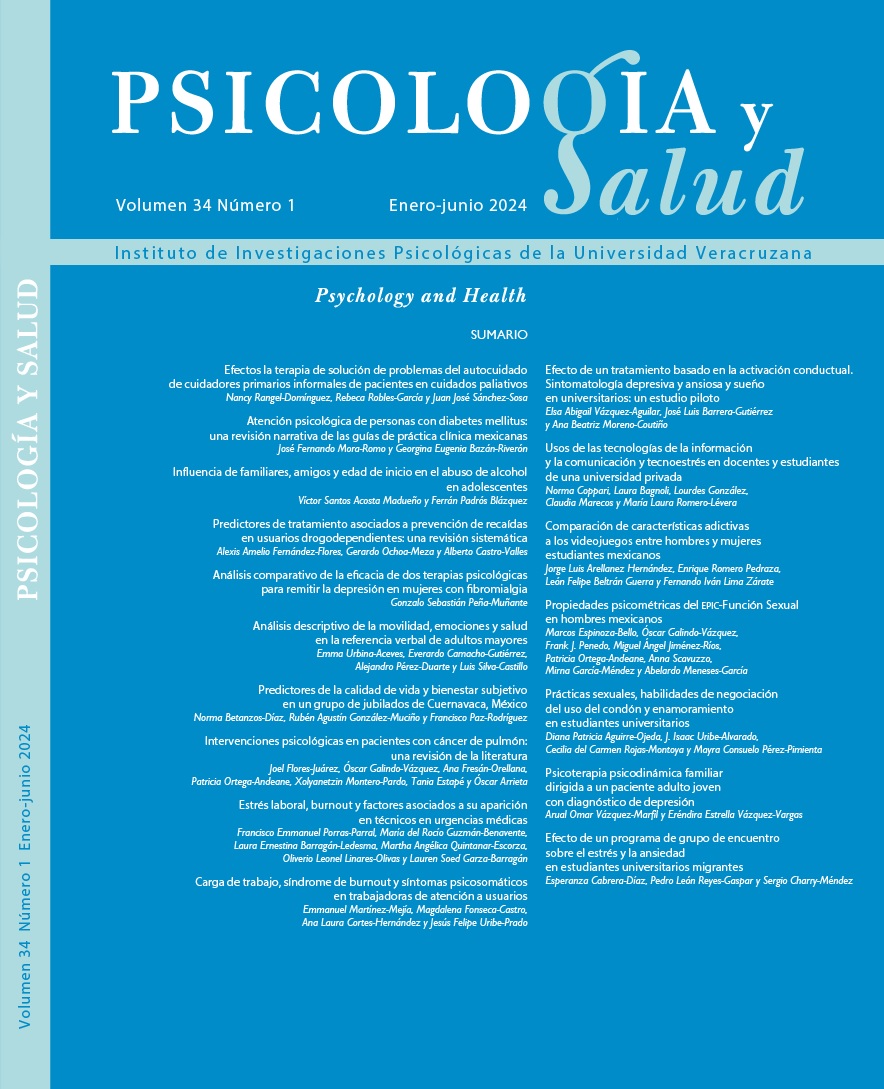Abstract
Depression and anxiety disorders are a worldwide problem reducing the quality of life of people suffering from them; the COVID-19 pandemic increased these symptoms, affecting specific populations. Behavioral Activation Therapy has evidence of its efficacy in these disorders. This study aimed to evaluate the effects of a psychological treatment based on Behavioral Activation on anxiety and depressive symptoms and sleep quality in university students. The study used an intrasubject design with pre-post measurements and a one-month follow-up. The participants were four female university students with anxiety and depressive symptoms classified from moderate to severe and received a group intervention of nine sessions. The results analyses included calculating the size of the clinical effect of the variables studied using Cardiel's Objective Clinical Change Coefficient, concluding that the Behavioral Activation intervention was effective in reducing anxiety and depressive symptoms, increasing the quality of sleep, and maintaining the results at follow-up.
References
Biel S., D., Carrobles I., J.A. y Antón G., M. (2021). Reducción del estigma, la depresión y la ansiedad en personas con VIH mediante un grupo terapéutico cognitivo conductual. Revista Internacional de Psicología Clínica y de la Salud, 29(2), 237-257.
Cardiel R., M. (1994). La medición de la calidad de vida. En L. Moreno, F. Cano V. y H. García R. (Eds.): Epidemiología clínica (pp. 189-199). México: Interamericana McGraw-Hill.
Chu, B.C., Colognori D., Weissman, A.S. y Bannon, K. (2009). An initial description and pilot of group behavioral activation therapy for anxious and depressed youth. Cognitive and Behavioral Practice, 16, 408-419. Doi: 10.1016/j.cbpra.2009.04.003
Churchill, R., Moore, T.H.M., Furukawa, T.A., Caldwel,l D.M., Davies, P., Jones, H., Shinohara, K., Imai, H., Lewis, G. y Hunot, V. (2013). Third wave’ cognitive and behavioural therapies versus treatment as usual for depression. Cochrane Database of Systematic Reviews, 10, Art. Núm. CD008705. Doi: 10.1002/14651858.CD008705.pub2
Dimidjian, S., Barrera Jr., M., Martell, C., Muñoz R., F. y Lewinsohn, P.M. (2011). The origins and current status of behavioral activation treatments for depression. Annual Review of Clinical Psychology, 7, 1-38. Doi: 10.1146/annurev-clinpsy-032210-104535
Dimidjian, S., Hollon, S.D., Dobson, K.S., Schmaling, K.B., Kohlenberg, R.J., Addis, M. E., Gallop, R., McGlinchey, J.B., Markley, D.K., Gollan, J.K., Atkins, D.C., Dunner, D.L. y Jacobson, N.S. (2006). Randomized trial of behavioral activation, cognitive therapy, and antidepressant medication in the acute treatment of adults with major depression. Journal of Consulting and Clinical Psychology, 74(4), 658-670. Doi: 10.1037/0022-006X.74.4.658
Egede, L.E., Dismuke, C.E., Walker, R.J., Acierno, R. y Frueh, B.C. (2018). Cost-effectiveness of behavioral activation for depression in older adult veterans: in-person care versus telehealth. The Journal of Clinical Psychiatry, 79(5), 17m11888. Doi: 10.4088/JCP.17m11888
Fereidooni, S., Gharaei, B., Birashk, B., Sahraeian, A. y Hoseini, S.M.D. (2015). Efficacy of group behavioral activation treatment as supplemental treatment to pharmacotherapy in inpatients with depressive disorders. Journal of Mood Disorders, 5, 104-112. Doi: 10.5455/JMOOD.20140913061428
García E., A., Castillo J., D.A., Cepeda, I., Pacheco J., L. y López R., P. (2019). Ansiedad y depresión en estudiantes universitarios: relación con el rendimiento académico. Interdisciplinary Journal of Epidemiology and Public Health, 2(1).
Hayes, S.C. y Hofmann, S.G. (2017). The third wave of cognitive behavioral therapy and the rise of process-based care. World Psychiatry: Official Journal of the World Psychiatric Association (WPA), 16(3), 245-246. Doi: 10.1002/wps.20442
Jiménez G., A., Monteverde M., E., Nenclares P., A., Esquivel A., G. y De la Vega P., A. (2008). Confiabilidad y análisis factorial de la versión en español del Índice de Calidad de Sueño de Pittsburgh en pacientes psiquiátricos. Gaceta Médica Mexicana, 144(6), 491-496.
Kanter, J.W., Puspitasari, A.J., Santos, M.M. y Nagy, G.A. (2012). Behavioural activation: history, evidence and promise. The British Journal of Psychiatry, 200(5), 361-363. Doi: 10.1192/bjp.bp.111.103390
Lukowski, A.F. y Milojevich, H.M. (2017). Sleep problems and temperament in young children with Down syndrome and typically developing controls. Journal of Intellectual Disability Research, 61(3), 221-232. Doi: 10.1111/jir.12321
Mendoza C., L., Flores J., J., Núñez H., J., Guzmán S., R., Lerma, A. y Galindo V., O. (s.f.). Propiedades psicométricas del Cuestionario sobre la Salud del Paciente (PHQ-9) y de la Escala del Trastorno de Ansiedad Generalizada (GAD-7) en población general mexicana. Documento inédito. Ciudad de México: Instituto Nacional de Cancerología.
Moreno C., A. (2012). Terapias cognitivo-conductuales de tercera generación (TTG): la atención plena (Mindfulness). Revista Internacional de Psicología, 12(1). Doi: 10.33670/18181023.v12i01.66
Nyer, M., Farabaugh, A., Fehling, K., Soskin, D., Holt, D., Papakostas, G.I., Pedrelli, P., Fava, M., Pisoni, A., Vitolo, O. y Mischoulon, D. (2013). Relationship between sleep disturbance and depression, anxiety, and functioning in college students. Depression and Anxiety, 30(9), 873-880. Doi: 10.1002/da.22064
Organización Mundial de la Salud (2017). Depresión. OMS.
Organización Mundial de la Salud (2019). Salud mental. OMS.
Organización Panamericana de la Salud (2017). OPS/OMS México: DMS 2017. OPS.
Suardiaz M., M., Morante R., M., Ortega M., M.A., Ruiz, P., Martín P., A. y Vela, B. (2020). Sueño y rendimiento académico en estudiantes universitarios: revisión sistemática. Revista de Neurología, 71, 43-53. Doi: 10.33588/rn.7102.2020015
Takagaki, K., Okamoto, Y., Jinnin, R., Mori, A., Nishiyama, Y., Yamamura, T. y Yamawaki, S. (2016). Mechanisms of behavioral activation for late adolescents: Positive reinforcement mediate the relationship between activation and depressive symptoms from pre-treatment to post-treatment. Journal of Affective Disorders, 204, 70-73. Doi: 10.1007/s00787-016-0842-5
Tiller J.W. (2013). Depression and anxiety. The Medical Journal of Australia, 199(S6), S28-S31. Doi: 10.5694/mja12.10628 j
Villanueva T., Y.M., Jurado C., S. y Ramírez R., A. (2020). Adaptación de la Escala de Activación Conductual para la Depresión (BADS) en pacientes con cáncer. Psicooncología, 17(1), 25-39. Doi: 10.5209/psic.68239
Wong, S., Sun, Y.Y., Chan, A., Leung, M., Chao, D., Li, C., Chan, K., Tang, W.K., Mazzucchelli, T., Au, A. y Yip, B. (2018). Treating subthreshold depression in primary care: A randomized controlled trial of behavioral activation with mindfulness. Annals of Family Medicine, 16(2), 111-119. Doi: 10.1370/afm.2206

